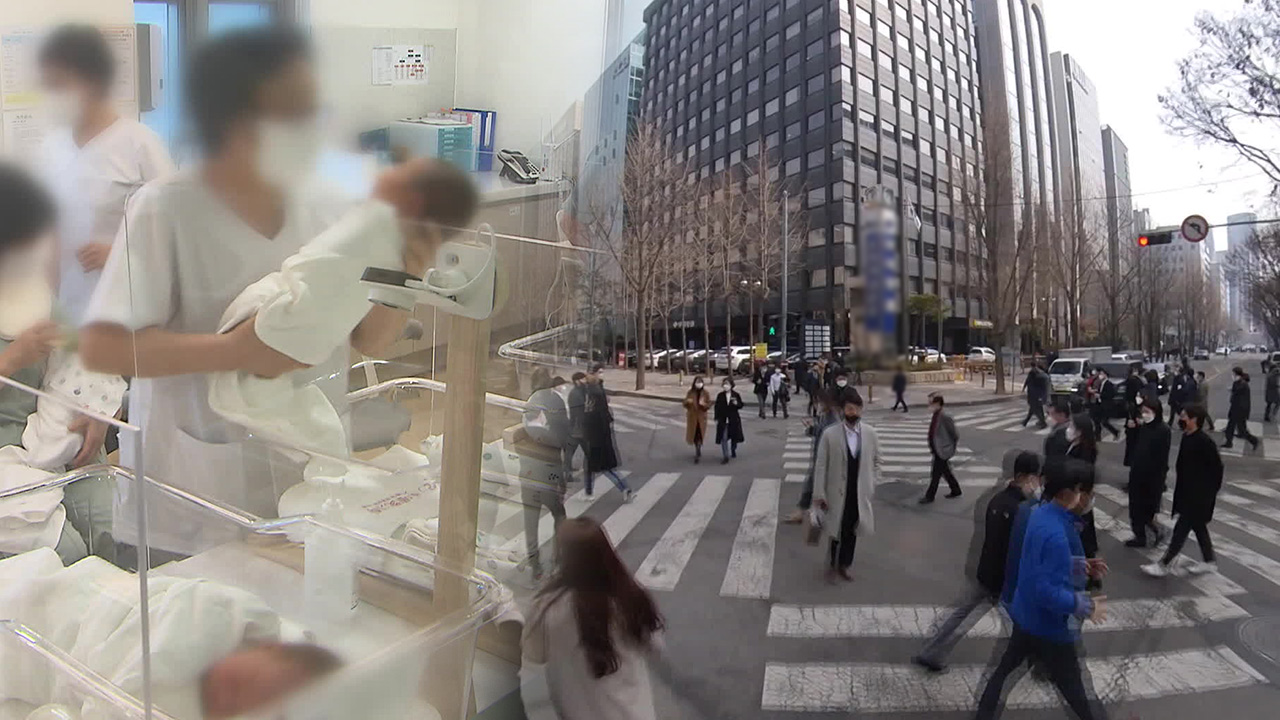Delay in establishing dedicated department may worsen population crisis
입력 2025.01.05 (01:07)
읽어주기 기능은 크롬기반의
브라우저에서만 사용하실 수 있습니다.
[Anchor]
Last year, the number of newborns in our country rebounded for the first time in nine years.
While this is welcoming news, the rebound is not significant, and the population crisis remains severe.
Concerns are rising that the delay in launching a dedicated population crisis response department may lead to missing the golden time.
This is a special report on the ultra-aged society by reporter Kim Min-kyung.
[Report]
In 2023, South Korea's total fertility rate was a record low of 0.72, and while the number of registered births last year saw a slight rebound for the first time in nine years, it still remains among the lowest level in the world.
Having already entered an ultra-aged society, projections suggest that in 25 years, four out of ten people in the total population will be elderly.
[Joo Hyung-hwan/Vice Chairman of the Low Birthrate and Aging Society Committee/Dec. 27: "There is not much time left. Experts point out that the golden time for policy responses is within the next 5 to 10 years..."]
Concerns about local extinction are also becoming a reality.
The proportion of elderly people in non-capital regions is already nearly 5 percentage points higher than in the capital region.
The excessive 'capital region concentration' phenomenon is causing polarization in various areas directly related to people's livelihoods, such as housing, jobs, and education.
This is why a policy redesign based on population structure is necessary.
[Cho Young-tae/Director of the Population Policy Research Center at Seoul National University: "We need to check whether the systems and policies currently in place will function properly in the 2030s and 2040s, and if not, we need to change them quickly..."]
Since last year, the government has been pushing for the establishment of a Population Strategy Planning Department that encompasses overall population policy.
However, the proposed amendment to the Government Organization Act, which includes the establishment of the Population Department, is stagnating in parliamentary discussions.
The Minister of the Interior and Safety, who is responsible for the government reorganization, has also stepped down due to the martial law situation.
[Hong Seok-cheol/Professor at the Department of Economics, Seoul National University: "The population issue is currently an opportunity for rebound, but I think there could be an unfortunate situation where we miss that opportunity."]
There are warnings that if the launch of a control tower to respond to the population crisis is delayed further, it could lead to even greater impacts in the future.
This is KBS News, Kim Min-kyung.
Last year, the number of newborns in our country rebounded for the first time in nine years.
While this is welcoming news, the rebound is not significant, and the population crisis remains severe.
Concerns are rising that the delay in launching a dedicated population crisis response department may lead to missing the golden time.
This is a special report on the ultra-aged society by reporter Kim Min-kyung.
[Report]
In 2023, South Korea's total fertility rate was a record low of 0.72, and while the number of registered births last year saw a slight rebound for the first time in nine years, it still remains among the lowest level in the world.
Having already entered an ultra-aged society, projections suggest that in 25 years, four out of ten people in the total population will be elderly.
[Joo Hyung-hwan/Vice Chairman of the Low Birthrate and Aging Society Committee/Dec. 27: "There is not much time left. Experts point out that the golden time for policy responses is within the next 5 to 10 years..."]
Concerns about local extinction are also becoming a reality.
The proportion of elderly people in non-capital regions is already nearly 5 percentage points higher than in the capital region.
The excessive 'capital region concentration' phenomenon is causing polarization in various areas directly related to people's livelihoods, such as housing, jobs, and education.
This is why a policy redesign based on population structure is necessary.
[Cho Young-tae/Director of the Population Policy Research Center at Seoul National University: "We need to check whether the systems and policies currently in place will function properly in the 2030s and 2040s, and if not, we need to change them quickly..."]
Since last year, the government has been pushing for the establishment of a Population Strategy Planning Department that encompasses overall population policy.
However, the proposed amendment to the Government Organization Act, which includes the establishment of the Population Department, is stagnating in parliamentary discussions.
The Minister of the Interior and Safety, who is responsible for the government reorganization, has also stepped down due to the martial law situation.
[Hong Seok-cheol/Professor at the Department of Economics, Seoul National University: "The population issue is currently an opportunity for rebound, but I think there could be an unfortunate situation where we miss that opportunity."]
There are warnings that if the launch of a control tower to respond to the population crisis is delayed further, it could lead to even greater impacts in the future.
This is KBS News, Kim Min-kyung.
■ 제보하기
▷ 카카오톡 : 'KBS제보' 검색, 채널 추가
▷ 전화 : 02-781-1234, 4444
▷ 이메일 : kbs1234@kbs.co.kr
▷ 유튜브, 네이버, 카카오에서도 KBS뉴스를 구독해주세요!
- Delay in establishing dedicated department may worsen population crisis
-
- 입력 2025-01-05 01:07:55

[Anchor]
Last year, the number of newborns in our country rebounded for the first time in nine years.
While this is welcoming news, the rebound is not significant, and the population crisis remains severe.
Concerns are rising that the delay in launching a dedicated population crisis response department may lead to missing the golden time.
This is a special report on the ultra-aged society by reporter Kim Min-kyung.
[Report]
In 2023, South Korea's total fertility rate was a record low of 0.72, and while the number of registered births last year saw a slight rebound for the first time in nine years, it still remains among the lowest level in the world.
Having already entered an ultra-aged society, projections suggest that in 25 years, four out of ten people in the total population will be elderly.
[Joo Hyung-hwan/Vice Chairman of the Low Birthrate and Aging Society Committee/Dec. 27: "There is not much time left. Experts point out that the golden time for policy responses is within the next 5 to 10 years..."]
Concerns about local extinction are also becoming a reality.
The proportion of elderly people in non-capital regions is already nearly 5 percentage points higher than in the capital region.
The excessive 'capital region concentration' phenomenon is causing polarization in various areas directly related to people's livelihoods, such as housing, jobs, and education.
This is why a policy redesign based on population structure is necessary.
[Cho Young-tae/Director of the Population Policy Research Center at Seoul National University: "We need to check whether the systems and policies currently in place will function properly in the 2030s and 2040s, and if not, we need to change them quickly..."]
Since last year, the government has been pushing for the establishment of a Population Strategy Planning Department that encompasses overall population policy.
However, the proposed amendment to the Government Organization Act, which includes the establishment of the Population Department, is stagnating in parliamentary discussions.
The Minister of the Interior and Safety, who is responsible for the government reorganization, has also stepped down due to the martial law situation.
[Hong Seok-cheol/Professor at the Department of Economics, Seoul National University: "The population issue is currently an opportunity for rebound, but I think there could be an unfortunate situation where we miss that opportunity."]
There are warnings that if the launch of a control tower to respond to the population crisis is delayed further, it could lead to even greater impacts in the future.
This is KBS News, Kim Min-kyung.
Last year, the number of newborns in our country rebounded for the first time in nine years.
While this is welcoming news, the rebound is not significant, and the population crisis remains severe.
Concerns are rising that the delay in launching a dedicated population crisis response department may lead to missing the golden time.
This is a special report on the ultra-aged society by reporter Kim Min-kyung.
[Report]
In 2023, South Korea's total fertility rate was a record low of 0.72, and while the number of registered births last year saw a slight rebound for the first time in nine years, it still remains among the lowest level in the world.
Having already entered an ultra-aged society, projections suggest that in 25 years, four out of ten people in the total population will be elderly.
[Joo Hyung-hwan/Vice Chairman of the Low Birthrate and Aging Society Committee/Dec. 27: "There is not much time left. Experts point out that the golden time for policy responses is within the next 5 to 10 years..."]
Concerns about local extinction are also becoming a reality.
The proportion of elderly people in non-capital regions is already nearly 5 percentage points higher than in the capital region.
The excessive 'capital region concentration' phenomenon is causing polarization in various areas directly related to people's livelihoods, such as housing, jobs, and education.
This is why a policy redesign based on population structure is necessary.
[Cho Young-tae/Director of the Population Policy Research Center at Seoul National University: "We need to check whether the systems and policies currently in place will function properly in the 2030s and 2040s, and if not, we need to change them quickly..."]
Since last year, the government has been pushing for the establishment of a Population Strategy Planning Department that encompasses overall population policy.
However, the proposed amendment to the Government Organization Act, which includes the establishment of the Population Department, is stagnating in parliamentary discussions.
The Minister of the Interior and Safety, who is responsible for the government reorganization, has also stepped down due to the martial law situation.
[Hong Seok-cheol/Professor at the Department of Economics, Seoul National University: "The population issue is currently an opportunity for rebound, but I think there could be an unfortunate situation where we miss that opportunity."]
There are warnings that if the launch of a control tower to respond to the population crisis is delayed further, it could lead to even greater impacts in the future.
This is KBS News, Kim Min-kyung.
-
-

김민경 기자 mkdream@kbs.co.kr
김민경 기자의 기사 모음
-
이 기사가 좋으셨다면
-
좋아요
0
-
응원해요
0
-
후속 원해요
0










![[속보] 상법 개정안, 여야 합의로 국회 본회의 통과](/data/layer/904/2025/07/20250703_831hGu.jpg)
![[속보] 국회, 김민석 총리 임명동의안 가결…국민의힘 표결 불참](/data/layer/904/2025/07/20250703_UCvuiM.png)



이 기사에 대한 의견을 남겨주세요.